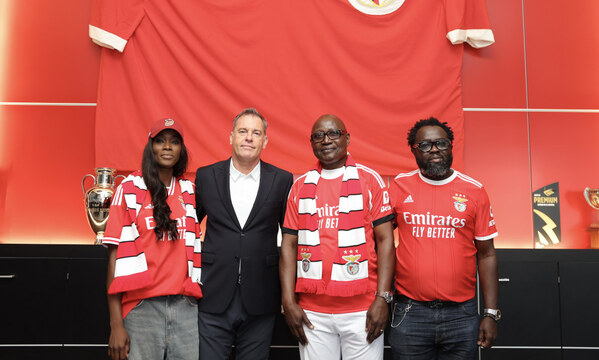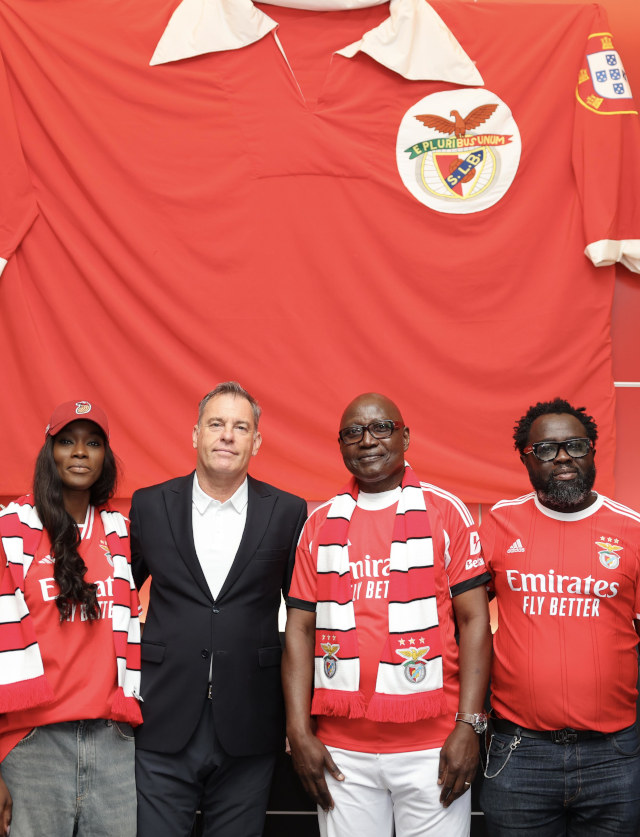Conteúdo Exclusivo para Contas SL Benfica
Para continuares a ler este conteúdo, inicia sessão ou cria uma Conta SL Benfica.
Football
Youth Football
Other Sports
Activities
Services
Events
Fans
Press and Accreditation
Fashion
Stationery and Gifts
Wine Shop
Collections
Red Pass
New Members
Family
Mais Vantagens
Corporate
Events
Merchandising
Mais Vantagens
Licensing
Sponsorships
Casas do Benfica
Benfica Foundation
Club
SAD
Facilities
ECO BENFICA
Press and Accreditation
Women's Football
Benfica Campus
Training like Benfica
Training and Development Centers
Handball
Volleyball
Basketball
Futsal
Roller Hockey
Schools
Combat Sports
Billiards
Swimming
Water Polo
Table tennis
Triathlon
Institutional Support
Sport Fishing
Birthdays
Benfica Race
Man
Computers and Sound
Home accessories
Sports and Leisure
Suggestions
Harvest
Reserve
Executive Seats
Spaces
Casas Benfica 2.0
Contacts
Accountability
Shares in Publicly Traded Companies
Public Offerings
Admission to Trading of Securities/File
Cosme Damião Benfica Museum
Para continuares a ler este conteúdo, inicia sessão ou cria uma Conta SL Benfica.
Football
The Benfica coach received the Coach of the Year 2022/23 award and was interviewed as part of the Thinking Football Summit organised by Liga Portugal.
09 September 2023, 19h08

Roger Schmidt
"I'm very happy about this award. As I said on Thursday [7 September], football is a team sport and I have to share the award with the players, staff, coaching team, and Benfica. It's only through collective success that we can win individual awards," he said.
This set the tone for an interview conducted by Ricardo Rocha, a former Benfica player, in which Roger Schmidt spoke about the challenge of the Portuguese league and the tactical ideas of the Reds, among other subjects.
How many Portuguese league matches did you watch before joining Benfica?
To be honest, there weren't many. When I decided to end my association with PSV and start a new challenge, there was talk of Benfica being a good option for me. At that point I started watching a few Benfica games, some in the Champions League and others in the Portuguese league, to get an idea of the players and the squad. But for me, the important thing isn't what happened in the past, because things happen when I start a job. I have a game philosophy and I try to adjust it to the culture of the club and the key players. I'm very open to that. When I arrived at Benfica, I was focused on preparing for the season and starting from scratch. It was also a good moment for the players, because they had a new opportunity. Some developed very well under the new approach to the game.
Compared to the other leagues you've coached in, is the Portuguese league the one where players have the least space on the pitch?
I don't think we can talk about the league as a whole. Each club has its own style, philosophy and approach. At the moment, many teams play with five defenders, and that was the case last season. That means there's always another defender on the line and lots of players in and around the box. The spaces are small, and we have to find solutions. It's important to be patient, creative, and accelerate at the right time. I'm used to that in match preparation. There are also times when we have different tasks, like counter-attacks. After we win the ball back, it's important to find solutions against opponents with defenders further back. We have to press, make transitions, and find good goal-scoring opportunities.
In the second half of last season, did you feel that the opposing managers knew your choices better? Did that make things more complicated for Benfica?
I think it's very easy to analyze our team because we always play the same way. We can have different approaches and ideas for the style of play, but I believe it's best to have your own ideas and not change your approach depending on the opponent. Both in the league and in the Champions League, we've always tried to believe in ourselves and create various moments in the game where we feel comfortable. If you watch Benfica play, we don't play a different style every week. We have our style, but we also have the flexibility to adapt to different issues. We play very intense football, with lots of moments of transition, and this season we're playing the same as last, trying to adjust a few things and make some improvements. Overall, we won most of the games, we were competitive, and we managed to implement our style regardless of the opponent.

To what extent has your way of training and playing changed in the Portuguese league?
I always change a little. I never wanted to become a coach, it was fate or coincidence. I started at an amateur level, in the 5th or 6th divisions of the German leagues. I know that amateur level, and I worked my way up through the various leagues to the top. Of course, during that time I developed, gained experience, and realized what works and what doesn't work. Of course my training today is different to what it used to be, especially because in recent years I've been training teams that play international football, where they play on a Saturday and Wednesday with the Champions League. It's completely different in terms of training. During pre-season, we have to do everything in technical and physical terms, and in terms of team building. During the season we're just playing and recovering, so the coaches have to do maintenance training, which is totally different to having a week to prepare the team. My mindset when it comes to football is to keep it simple. The most important thing is to win. We mustn't make things too complicated for the players. I change some exercises, but we have to be close to the task we have over the weekend, which is important for developing the players. In Portugal, my approach to fitness was very similar to what I did before.
Last season, you faced very strong opponents in the Champions League. Was it easy to prepare for these kinds of games where there were more spaces than in the Portuguese league?
We had matches against Juventus, Maccabi and PSG. It was a very difficult group, but we had confidence and the chance to reach the knockout stage. It was very important to win the first game, with Maccabi, at home, but it was very difficult because they had a good team. For us, it was fantastic to win the second match, away, against Juventus. Winning away is very important for the rest of the group stage. It was also very good for our players, as it was the first time we'd played a top international team. Our approach from the start was to believe in ourselves, even with Juventus, we want to play with high pressure, and I think it was the first time we showed that quality and belief in ourselves, also in a very big game. Winning away was great for the players, it was a key game for us to believe in ourselves, gaining more confidence. With the win, the players started to believe more in themselves, in their team-mates and in our approach to the game.
But is it easier to prepare for Champions League matches?
What's different is that the player's focus and concentration come more on their own. As I said, the players also want to play in the Champions League, and maybe that's an advantage, but from a preparation point of view, we prepare for the game in the same way we prepare for a Portuguese league game. There are no differences for us.
What do you like most about Portuguese players?
I like their technical skills, I think they're very good. There are very good Portuguese players with a very good touch on the ball. We're a Portuguese team, but we don't just have Portuguese players. What I like most is that they're very open players, they love playing football, they keep that love and passion for playing football. That's great for me as a coach. They can work hard, but I especially appreciate technical football, I like it a lot, and the Portuguese players are capable of practicing it.
What do you think of the Portuguese league?
It's a top competition in Europe, because I feel it's difficult to win games. We're competitive in the Champions League, we were in the quarter-finals last season, we did well in the Champions League, we're a good team, but every game in the Portuguese league was difficult, especially the away games. In other words, this means that even the smaller teams have good players, and that surprised me. As we see in international football, Braga have qualified for the Champions League, Portugal will once again have three teams [in the group stage]. Last season I think all the teams did very well, nobody likes playing against Portuguese teams because they have quality. The league is very good, with very good football and very good coaches, and that's always a challenge. I really like this competition.
Text: Duarte Tornesi and Paulo Nunes Teixeira
Photos: Liga Portugal
Last update: Thursday, March 21, 2024



















